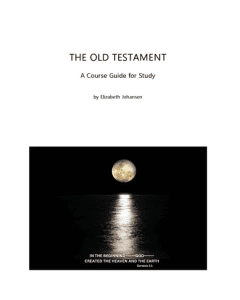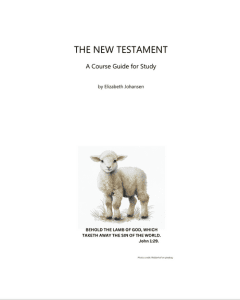Article-at-a-Glance
- Elizabeth Johansen’s Bible study guides pack a lifetime of her love of Scripture into two workbooks – one for the Old Testament and one for the New Testament.
- Studying the Bible offers spiritual guidance and personal growth, helping us face modern challenges with faith and wisdom.
- Elizabeth Johansen’s Old Testament Study Guide provides 65 lessons to deepen your understanding of biblical teachings.
- The New Testament Study Guide by Elizabeth Johansen focuses on the relevance of its teachings in today’s world.
- Effective Bible study methods include the inductive approach, which involves observation, interpretation, and application.
- Consistency, a conducive study environment, and a balance between personal reflection and group discussions are key to effective Bible study.
The Author’s Story
My mother, Elizabeth Johansen, grew up on a ranch in the Texas panhandle. She was one of eight children in a family faithful to the Presbyterian Church. They experienced all the uncertainties of a ranching/farming life and were part of the generation that survived World War I, the Great Depression, and World War II. My parents met and married a few years after the end of WWII, making my brothers and me baby boomers.
When I was growing up, Mother taught Bible classes at the local high school – Old Testament in the fall semester and New Testament in the spring semester. She made her course an amazing experience. She sponsored a Bible Club, which often won first place for their homecoming floats. The Club also built nativity scenes on the roof of the gymnasium porch at Christmas, provided Easter assemblies some years, and took a trip in the spring, usually to the Davis Mountains or to Six Flags over Texas.
Passing on a Lifetime of Love and Learning
For most of her career, Mother used commercially available workbooks for her classes. But a few years before she retired, she wrote her own workbooks and began using those in her classes. Although she died in 1985, it was not until 2019 that I typed the workbooks – one for the Old Testament and one for the New Testament – into my computer. Then late last year, I decided to offer them for sale on Sqrindle. (Find them here: Old Testament Study Guide and New Testament Study Guide)
The workbooks are designed for high school students and, together, form an excellent study guide for the whole Bible. I probably learned as much about the Bible in the nine months of Mother’s class as I’ve learned in all the rest of my life.
Although the workbooks include many simple, short-answer questions, they include thought questions, as well. You will have to read the assigned Scriptures, develop your own beliefs, and express your conclusions. Of course, those are the questions that are ideal for discussion in small-group Bible studies.
The Importance of Bible Study in Modern Times
In today’s fast-paced world, finding time for spiritual reflection can be challenging. However, Bible study remains a vital practice for those seeking to deepen their spiritual understanding and find guidance amidst life’s complexities. The Bible’s teachings offer timeless wisdom that can be applied to modern dilemmas, providing clarity and direction.
“Few activities in life are more rewarding than Bible study. As you work through these lessons, I hope you will deepen your understanding of and love for the Lord Who created you, Who loves you, and Who sent His Son to redeem you.” – Betty Johansen
Connecting Spiritual Teachings to Current Challenges
One of the greatest benefits of Bible study is its ability to connect ancient teachings with contemporary issues. Whether facing personal struggles or societal challenges, the Bible provides insights that can guide our actions and decisions. By exploring its stories and lessons, we can learn how to navigate today’s world with faith and resilience.
Most importantly, Bible study encourages us to look beyond immediate concerns and consider broader ethical and moral implications. It challenges us to reflect on our values and align our lives with higher principles.
- Explore themes of justice, compassion, and forgiveness.
- Apply biblical lessons to personal and communal challenges.
- Reflect on moral dilemmas with a spiritual perspective.
Providing Guidance and Comfort in Daily Life
Besides offering guidance, the Bible serves as a source of comfort in times of distress. Its teachings remind us of God’s love and presence, reassuring us that we are never alone. By regularly engaging with Scripture, we can strengthen our faith and find solace in God’s promises.
Consider this: in moments of anxiety or uncertainty, turning to the Bible can provide peace and reassurance. The Psalms, for example, are filled with expressions of trust and hope that can uplift our spirits.
“The Lord is my shepherd; I shall not want. He maketh me to lie down in green pastures: he leadeth me beside the still waters.” – Psalm 23:1-2
Cultivating a Personal Relationship with God
Through Bible study, we can cultivate a deeper, more personal relationship with God. By engaging with Scripture, we open ourselves to divine wisdom and allow God to speak to us through His Word. This ongoing dialogue enriches our spiritual journey and helps us grow in faith and understanding.
Moreover, studying the Bible together with others can foster a sense of community and shared purpose. Group discussions provide opportunities to learn from different perspectives and support one another in our spiritual journeys.
Old Testament Study Guide by Elizabeth Johansen
Elizabeth Johansen’s Old Testament Study Guide is an invaluable resource for those seeking to explore the rich teachings of the Old Testament. With 65 lessons, this guide provides a structured approach to understanding the historical, cultural, and spiritual contexts of these ancient texts.
Overview of the Old Testament Structure
The Old Testament is a diverse collection of writings that includes history, poetry, prophecy, and law. Understanding its structure can help us appreciate the coherence and depth of its messages. Johansen’s guide offers an accessible overview, making it easier for readers to navigate these complex texts.
Key Lessons from the Old Testament
The Old Testament is filled with stories of faith, resilience, and divine intervention. From the creation narrative in Genesis to the prophetic visions in Isaiah, these texts offer profound insights into God’s relationship with humanity. Johansen’s study guide highlights key lessons and themes, encouraging readers to reflect on their relevance in today’s world.
How This Workbook Can Enhance Your Spiritual Growth
By engaging with Johansen’s Old Testament Study Guide, readers can deepen their understanding of biblical teachings and apply them to their own lives. The guide’s structured approach encourages thoughtful reflection and meaningful application, fostering spiritual growth and transformation.
As you work through the lessons, take the time to meditate on the passages and consider their implications for your personal journey. Allow the Old Testament’s wisdom to inspire and challenge you, leading to a more profound connection with God.

New Testament Study Guide by Elizabeth Johansen
Elizabeth Johansen’s New Testament Study Guide is a comprehensive resource designed to help readers explore the teachings and messages of the New Testament. This guide provides insights into the life and ministry of Jesus Christ, the growth of the early church, and the foundational principles of Christian faith. By engaging with this guide, you can gain a deeper understanding of how these ancient texts remain relevant in our modern world.
Understanding the New Testament’s Relevance Today
The New Testament is not just a historical document; it is a living text that continues to speak to us today. Its teachings address timeless human concerns, such as love, justice, and redemption. By studying the New Testament, we can find guidance for navigating contemporary challenges and living a life of purpose and meaning. For those interested in a structured approach, consider exploring a New Testament Study Guide to deepen your understanding.
- Explore the life and teachings of Jesus Christ.
- Understand the growth and challenges of the early church.
- Apply the principles of love, forgiveness, and service in daily life.
By reflecting on these teachings, we can draw inspiration and strength to face the complexities of modern life with faith and resilience.
Most importantly, the New Testament encourages us to build a personal relationship with God through Jesus Christ. This relationship is the foundation of our spiritual journey and guides us in our interactions with others.
Main Themes and Messages of the New Testament
The New Testament is rich with themes that are central to Christian faith and practice. From the Gospels’ accounts of Jesus’ life and teachings to the epistles’ guidance for early Christians, these texts offer insights into God’s love and grace. Key themes include salvation, the Kingdom of God, and the transformative power of faith.
By studying these themes, we can better understand the core messages of the New Testament and how they apply to our lives today. This understanding can lead to a more profound appreciation of God’s work in the world and our role in His plan.
Integrating the Teachings into Your Life
Integrating the teachings of the New Testament into your life involves more than just reading the text; it requires active reflection and application. Consider how the lessons of love, humility, and service can influence your daily actions and relationships. By living out these principles, you can become a reflection of Christ’s love in the world.
Take time to meditate on the passages and pray for guidance in applying their lessons. Engage in discussions with others to gain new perspectives and support each other in your spiritual growth. Through this process, you can experience the transformative power of the New Testament’s teachings.
Utilizing Bible Study Methods for Deeper Insights
Effective Bible study involves more than just reading the text; it requires thoughtful engagement and reflection. Using structured study methods, you can gain deeper insights into the Bible’s teachings and apply them to your life. One such method is the inductive study approach, which involves observation, interpretation, and application.
How the Inductive Study Method Transforms Understanding
The inductive study method is a powerful tool for deepening your understanding of the Bible. It involves three steps: observation, interpretation, and application. By carefully observing the text, you can identify key themes and messages. Interpretation involves understanding the meaning of these messages in their historical and cultural context. Finally, application involves considering how these teachings can be applied to your life.
This method encourages active engagement with the text and helps you develop a more nuanced understanding of its teachings. By using the inductive approach, you can uncover new insights and deepen your spiritual growth.
The Role of Prayer in Bible Study
Prayer is an essential component of effective Bible study. It helps us connect with God and seek His guidance as we explore His Word. By praying before, during, and after your study sessions, you can invite the Holy Spirit to illuminate your understanding and provide insight into the text.
Consider setting aside time for prayerful reflection as you study the Bible. Ask God to open your heart and mind to His teachings and to guide you in applying them to your life. This practice can enhance your study experience and deepen your relationship with God.

Leveraging Commentaries and Study Aids
Besides personal reflection, using commentaries and study aids can enhance your Bible study experience. These resources provide valuable context and insights into the text, helping you understand its historical and cultural background. By leveraging these tools, you can gain a more comprehensive understanding of the Bible’s teachings.
Consider using a study Bible, which includes notes and explanations alongside the text, or exploring online resources such as the Blue Letter Bible. These tools can help you clarify difficult passages and gain new perspectives on familiar stories.
Practical Tips for Effective Bible Study
- Set a consistent study schedule to ensure regular engagement with the text.
- Create a conducive environment for study, free from distractions.
- Balance personal reflection with group discussions to gain new insights.
By following these tips, you can create a meaningful and enriching Bible study practice that supports your spiritual growth and deepens your understanding of God’s Word.
Remember, the goal of Bible study is not just to gain knowledge, but to transform your heart and life. Allow the teachings of the Bible to inspire and guide you as you journey in faith.
As you continue to explore the Bible, may you find wisdom, strength, and joy in its pages, and may your study lead you to a deeper relationship with God.
Setting a Consistent Study Schedule
Creating a consistent study schedule is essential for developing a meaningful Bible study practice. By setting aside dedicated time each day or week, you can ensure regular engagement with the text and make Bible study a priority in your life. Consistency helps build a habit of reflection and allows you to delve deeper into the teachings of the Bible.
Start by identifying a time that works best for you, whether it’s early in the morning, during a lunch break, or in the evening. Choose a time when you can focus without distractions and make it a non-negotiable part of your routine. Over time, this commitment will become a natural part of your day, enhancing your spiritual growth.
Creating a Conducive Environment for Study
A conducive study environment is crucial for effective Bible study. Find a quiet, comfortable space where you can concentrate without interruptions. Consider setting up a dedicated study area with all the materials you need, such as a Bible, notebook, and any study aids you use.
Eliminate distractions by turning off electronic devices or finding a location away from noise. Creating a peaceful atmosphere can help you focus on the text and engage more deeply with its teachings. Additionally, consider incorporating elements that enhance your study experience, such as soft lighting, calming music, or a comfortable chair.
Balancing Personal Reflection with Group Discussions
While personal reflection is an essential part of Bible study, engaging in group discussions can provide valuable insights and perspectives. Balancing these two approaches allows you to explore the text on your own while benefiting from the shared experiences and interpretations of others.
Consider joining a Bible study group or forming one with friends or family. Group discussions can deepen your understanding of the text and provide opportunities for fellowship and support. As you engage in these conversations, be open to different viewpoints and willing to learn from others.
Frequently Asked Questions
As you embark on your Bible study journey, you may have questions about how to approach the text and make the most of your study time. Here are some common questions and answers to help guide you.
How often should I study the Bible for meaningful growth?
The frequency of your Bible study can vary based on your schedule and goals. However, regular engagement with the text is key to meaningful growth.
- Daily study can provide consistent spiritual nourishment and reflection.
- Weekly study sessions may be more manageable for those with busy schedules.
- Monthly deep dives into specific books or themes can offer focused exploration.
Ultimately, the goal is to find a rhythm that works for you and supports your spiritual journey. Consistency, rather than frequency, is often more important for sustained growth.
Remember, it’s not about the amount of time you spend, but the quality of your engagement with the text.
What are some common mistakes to avoid during Bible study?
Effective Bible study requires intentionality and focus. Here are some common mistakes to avoid:
First, avoid approaching the text with preconceived notions or biases. Allow the Bible to speak for itself and be open to new insights. Second, don’t rush through passages without taking the time to reflect on their meaning. Finally, avoid relying solely on external resources without engaging with the text directly. Personal reflection is crucial for a deeper understanding.
Do I need prior knowledge to start using Bible study guides?
No prior knowledge is necessary to begin using Bible study guides. These resources are designed to help individuals at all levels of familiarity with the Bible. Whether you’re new to Bible study or have been studying for years, guides can provide valuable structure and insights to enhance your understanding.
Start with a guide that matches your current level of knowledge and gradually explore more complex themes and passages as you become more comfortable with the text.
How do I choose the right study guide for my spiritual needs?
Choosing the right study guide involves considering your spiritual goals and interests. Here are some tips to help you select a guide that aligns with your needs:
- Identify specific themes or books of the Bible you want to explore.
- Consider the level of depth and complexity you’re comfortable with.
- Look for guides that offer practical applications and reflection questions.
***



Nothing beats opening the Bible and discovering its richness, but if you’d like to “inhale” the whole story in a couple of hours, please check out The Bible in Brief: A Historical Summary of God’s Story From the Beginning to the End of Time. You will find hard-copy versions on Amazon. (Note: The images in the paperback are in color, but in the hardcover they’re black and white because of the high cost of publishing a hardcover in color.) However, the ebook version on Sqrindle is pretty cool because you can click the links and go directly to Bible passages and other study aids.
Here are links to my blog indexes, which will make it quick and easy for you to find another post to read.
∙ Blogs with a Spiritual Theme
∙ Blogs about Books I Like: Fiction
∙ Blogs about Books I Like: Nonfiction
∙ Blogs for Holidays and Other Special Days
∙ Miscellaneous Blogs
